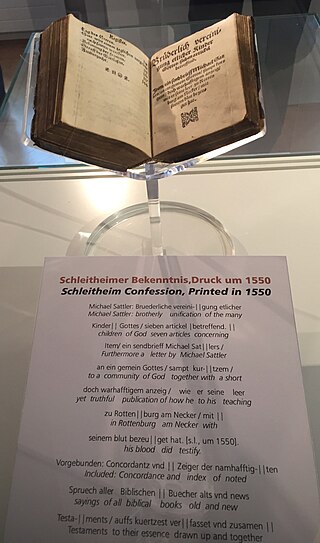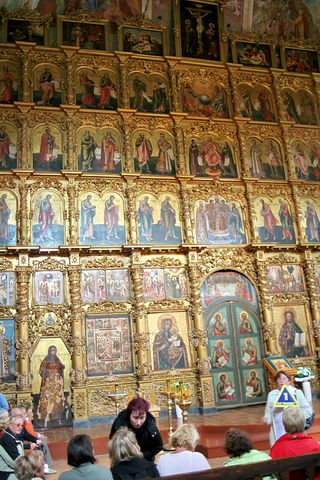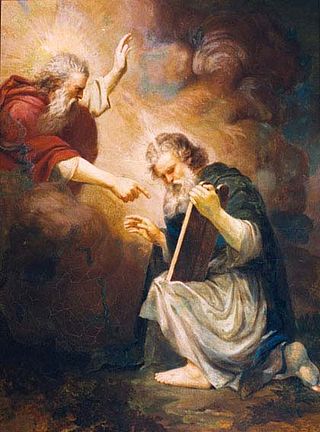Related Research Articles

A tithe is a one-tenth part of something, paid as a contribution to a religious organization or compulsory tax to government. Today, tithes are normally voluntary and paid in cash or cheques or more recently via online giving, whereas historically tithes were required and paid in kind, such as agricultural produce. After the separation of church and state, church tax linked to the tax system are instead used in many countries to support their national church. Donations to the church beyond what is owed in the tithe, or by those attending a congregation who are not members or adherents, are known as offerings, and often are designated for specific purposes such as a building program, debt retirement, or mission work.

Penance is any act or a set of actions done out of repentance for sins committed, as well as an alternate name for the Catholic, Lutheran, Eastern Orthodox, and Oriental Orthodox sacrament of Reconciliation or Confession. It also plays a part in confession among Anglicans and Methodists, in which it is a rite, as well as among other Protestants.

The Westminster Confession of Faith, or simply the Westminster Confession, is a Reformed confession of faith. Drawn up by the 1646 Westminster Assembly as part of the Westminster Standards to be a confession of the Church of England, it became and remains the "subordinate standard" of doctrine in the Church of Scotland and has been influential within Presbyterian churches worldwide.

Anabaptist theology, also known as Anabaptist doctrine, is a theological tradition reflecting the doctrine of the Anabaptist Churches. The major branches of Anabaptist Christianity agree on core doctrines but have nuances in practice. While the adherence to doctrine is important in Anabaptist Christianity, living righteously is stressed to a greater degree.

The Byzantine Rite, also known as the Greek Rite or the Rite of Constantinople, is a liturgical rite that is identified with the wide range of cultural, devotional, and canonical practices that developed in the Eastern Christian church of Constantinople.

The offertory is the part of a Eucharistic service when the bread and wine for use in the service are ceremonially placed on the altar.

In Christian tradition the churching of women, also known as thanksgiving for the birth or adoption of a child, is the ceremony wherein a blessing is given to mothers after recovery from childbirth. The ceremony includes thanksgiving for the woman's survival of childbirth, and is performed even when the child is stillborn, or has died unbaptized.
In keeping with its prevailing self-identity as a via media or "middle path" of Western Christianity, Anglican sacramental theology expresses elements in keeping with its status as a church in the catholic tradition and a church of the Reformation. With respect to sacramental theology the Catholic tradition is perhaps most strongly asserted in the importance Anglicanism places on the sacraments as a means of grace, sanctification and forgiveness as expressed in the church's liturgy.
Lay confession is confession in the religious sense, made to a lay person.
In the Catholic Church, the Precepts of the Church, sometimes called the Commandments of the Church, are certain laws considered binding on the faithful. As usually understood, they are moral and ecclesiastical, broad in character and limited in number. In modern times there are five.
Altarage is a term once commonly used in an ecclesiastical context to signify the revenue reserved for the chaplain in contradistinction to the income of the parish priest — it came to indicate the funds received by a priest from the laity when discharging a particular function for them, e.g., marriages, baptisms, and funerals. The term is largely obsolete, having been replaced by the more specific honorarium, stipend, or stole-fee.

The Ten Commandments are series of religious and moral imperatives that are recognized as a moral foundation in several of the Abrahamic religions, including the Catholic Church. As described in the Old Testament books Exodus and Deuteronomy, the Commandments form part of a covenant offered by God to the Israelites to free them from the spiritual slavery of sin. According to the Catechism of the Catholic Church—the official exposition of the Catholic Church's Christian beliefs—the Commandments are considered essential for spiritual good health and growth, and serve as the basis for Catholic social teaching. A review of the Commandments is one of the most common types of examination of conscience used by Catholics before receiving the sacrament of Penance.

Confirmation in the Lutheran Church is a public profession of faith prepared for by long and careful instruction. In English, it may also be referred to as "affirmation of baptism", and is a mature and public reaffirmation of the faith which "marks the completion of the congregation's program of confirmation ministry".
William of Pagula, also known as William Paull or William Poull, was a 14th-century English canon lawyer and theologian best known for his written works, particularly his manual for priests entitled the Oculus Sacerdotis. Pagula was made the perpetual vicar of the church at Winkfield on 5 March 1314, although he was absent from his parish for several years while pursuing a doctorate in Canon Law from the University of Oxford. After this was granted he returned to work with his parish, and his writings are written from the perspective of someone familiar with the job of a rural priest.
The Lutheran sacraments are "sacred acts of divine institution". They are also defined as “an outward and visible sign of an inward and spiritual grace.”.

There are seven sacraments of the Catholic Church, which according to Catholic theology were instituted by Jesus Christ and entrusted to the Church. Sacraments are visible rites seen as signs and efficacious channels of the grace of God to all those who receive them with the proper disposition.

A sacrament is a Christian rite that is recognized as being particularly important and significant. There are various views on the existence, number and meaning of such rites. Many Christians consider the sacraments to be a visible symbol of the reality of God, as well as a channel for God's grace. Many denominations, including the Roman Catholic, Lutheran, Presbyterian, Anglican, Methodist, and Reformed, hold to the definition of sacrament formulated by Augustine of Hippo: an outward sign of an inward grace, that has been instituted by Jesus Christ. Sacraments signify God's grace in a way that is outwardly observable to the participant.

John Mirk was an Augustinian Canon Regular, active in the late 14th and early 15th centuries in Shropshire. He is noted as the author of widely copied, and later printed, books intended to aid parish priests and other clergy in their work. The most famous of these, his Book of Festivals or Festial was probably the most frequently printed English book before the Reformation.

Christianization of the Franks was the process of converting the pagan Franks to Catholicism during the late 5th century and early 6th century. It was started by Clovis I, regulus of Tournai, with the insistence of his wife, Clotilde and Saint Remigius, the bishop of Reims.
The Summa confessorum, also known as the Summa de penitentia and the Summa Cum miseratione domini, is a 13th-century work on penance by Thomas of Chobham. It began to circulate in 1216 and survives in more than a hundred manuscripts.